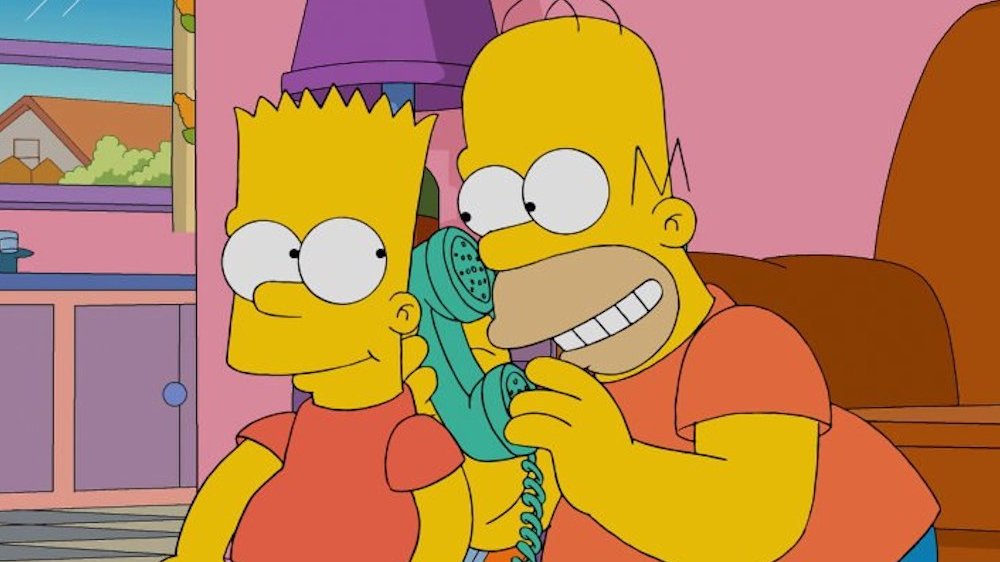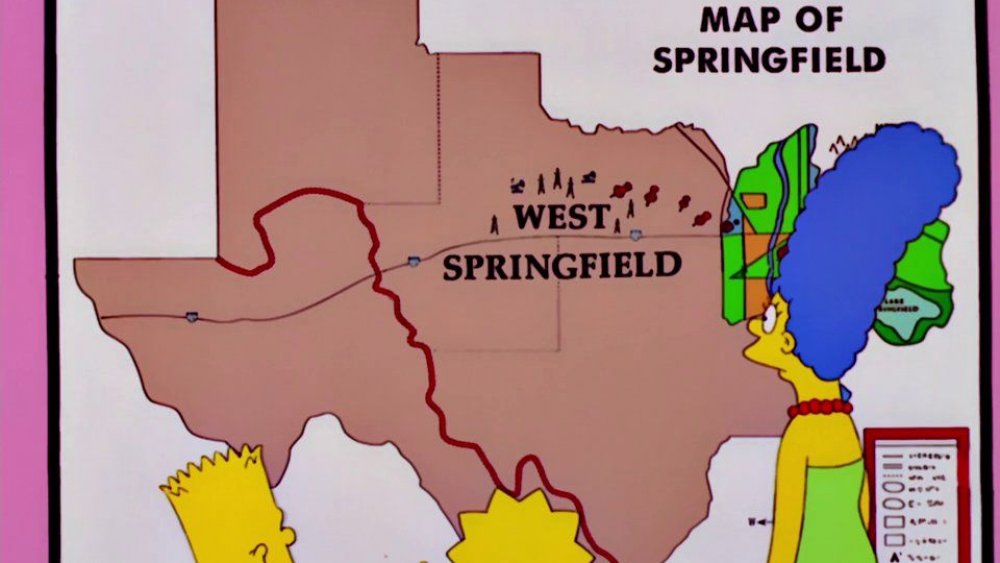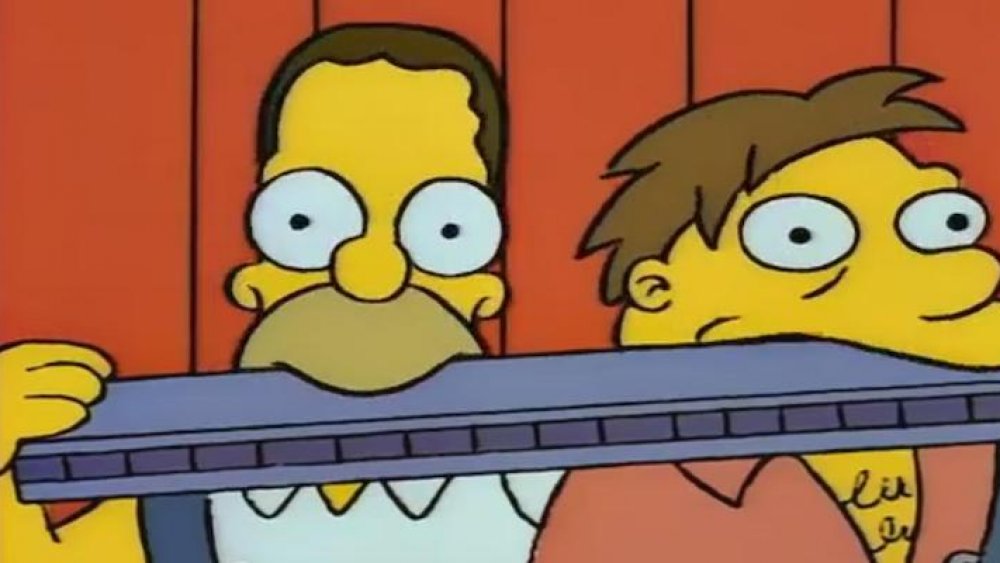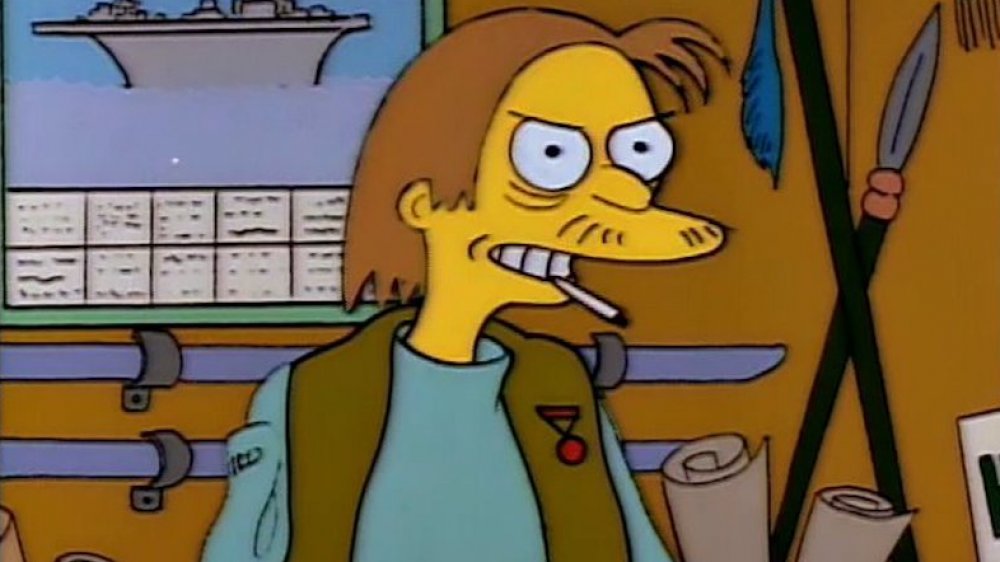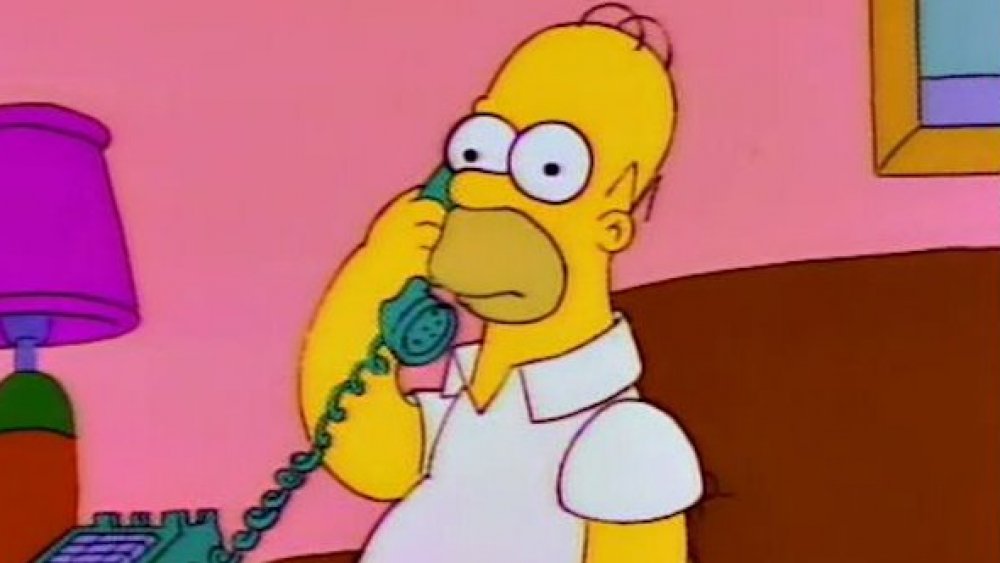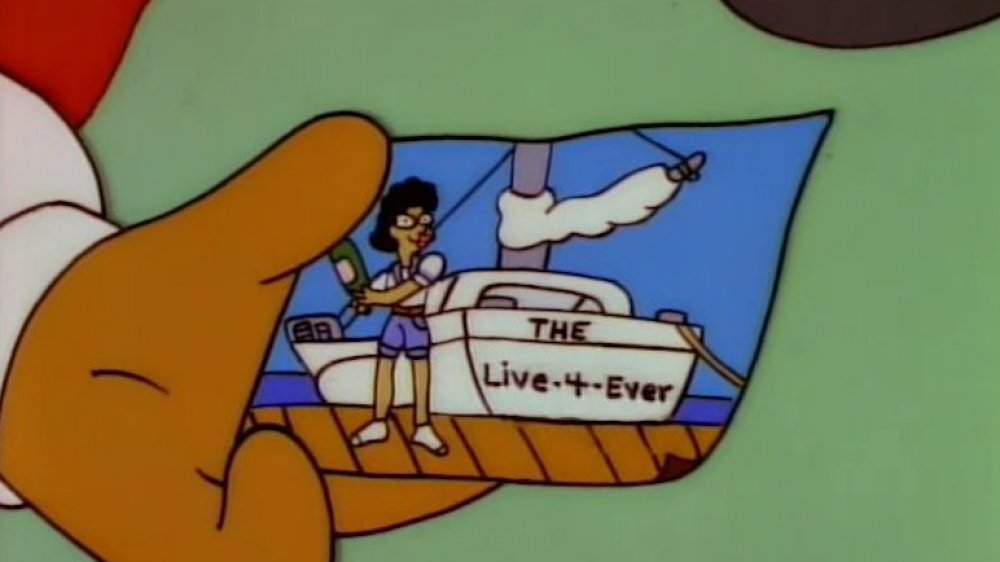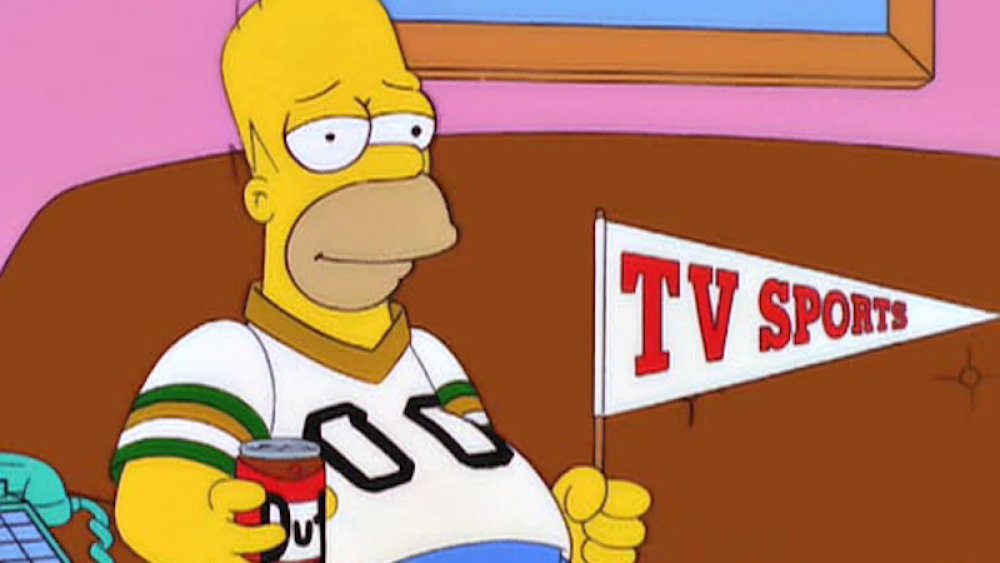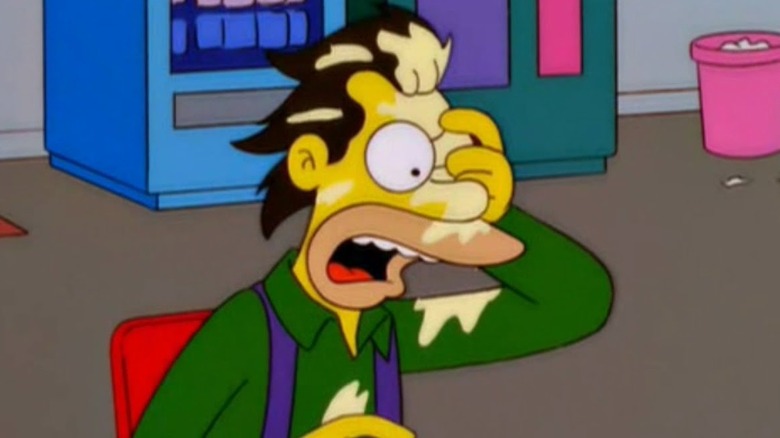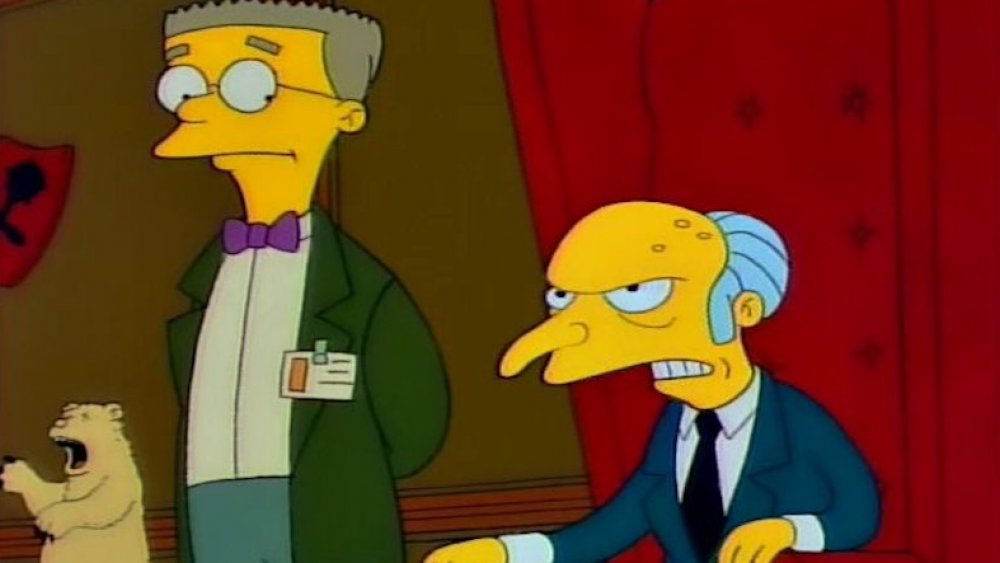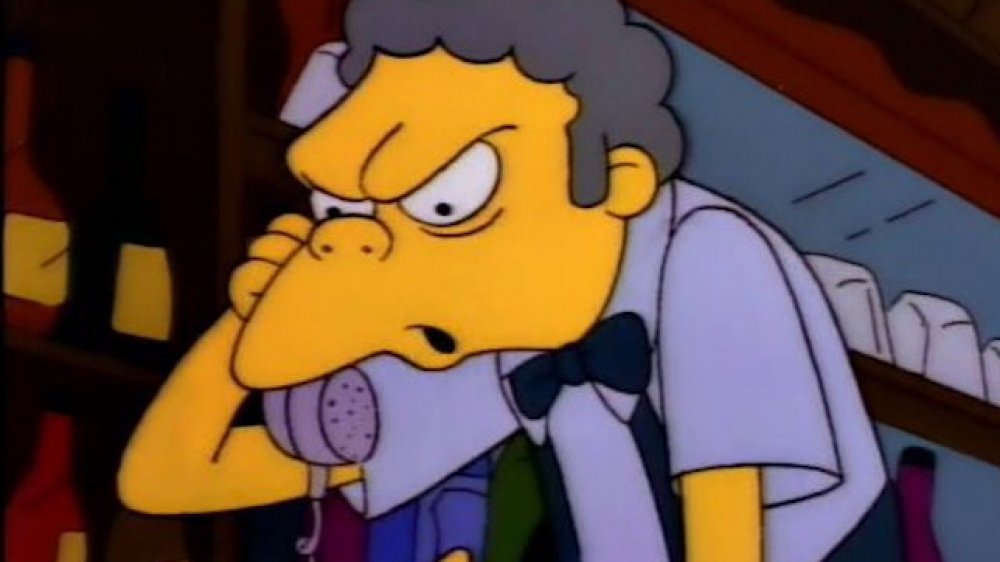The Best Long-Running Jokes On The Simpsons
Running gags are a fun treat for long-term fans of a TV show who are eager to spot a beloved recurring bit. It's also a great way to build character traits and to flesh out a television universe. And for The Simpsons in particular, running gags are expected and always welcome.
Arguably nothing in pop culture boasts more long-term, repeating jokes than this beloved sitcom. After all, the animated juggernaut has been running for more than 30 years, so it's had a lot of opportunities to lay out a joke and then return to the well to mine more laughs out of the same concept. For example, there's Bart Simpson's detention chalkboard messages, the new billboards overlooking downtown Springfield, and the imaginative and bizarre ways the Simpson family congregates on their couch in front of the TV.
But today, we're digging deep into the show's lore to find the funniest gags that pop up more than once. From odd geography to embarrassing photos, here are the best long-running jokes on The Simpsons.
Springfield's location is a fantastic Simpsons joke
The Simpsons is a satirical comedy, which means that to strike as broadly as possible, it has to be set in the most average-seeming place imaginable. So, writers came up with Springfield, a mediocre town that's also full of goofballs and weirdos. So as to not impose any regional characteristics on the mid-sized city (which shares a name with numerous real towns in the US) and keep it as down-the-middle and relatable as possible, the state where Springfield sits has aggressively never been revealed. All viewers really know about it is that its capital city is literally named Capital City and that the governor is named Mary Bailey.
Diligent Simpsons fans have looked for contextual clues for years, trying to ascertain Springfield's exact location, but they'll likely never find it — it's physically and geographically impossible for Springfield to be a real place. Information about its locale is purposely contradictory, and it's one of the show's best prolonged gags. In the Behind the Music parody episode "Behind the Laughter," Springfield's location is given as both northern Kentucky and southern Missouri. In The Simpsons Movie, a Springfield map shows the town is nestled in between such far-flung states as Ohio, Maine, and Nevada.
You might remember Troy McClure
When The Simpsons began its long run in the early 1990s, real-world television wasn't the peak TV paradise it is today. Cable, in particular, was a repository of junk, such as infomercials and cultural ephemera of the '70s and '80s. Those two concepts came together in a big way on The Simpsons, so the show could make fun of them, of course. In many episodes, Homer mindlessly watches television and comes across an infomercial invariably hosted by aging, washed-up, B-movie actor Troy McClure. "Hi, I'm Troy McClure!" he bellows. "You may remember me from such films as..." He then lists a couple of terrible-sounding old movies from his apparently vast resume of forgotten projects.
Among his dozens of credits, we've got The Boatjacking of Supership '79, Dial M for Murderousness, Here Comes the Coast Guard, They Came to Burgle Carnegie Hall, and Gladys the Groovy Mule. Troy, voiced by big-voiced Saturday Night Live cast member Phil Hartman, got a lot of hosting work in the Simpsons universe as he also introduced hotel information videos, telethons, and TV specials, while listing his corresponding past credits. His work in educational films is particularly hilarious, with such titles as Earwigs, Ew!, Lead Paint: Delicious but Deadly, and Two Minus Three Equals Negative Fun. The running gag comes full circle when the Simpson family actually meets Troy McClure and mentions the films they remember him from.
The long-running joke about Homer's lifelong dreams
Homer Simpson is a man of simple pleasures. He unabashedly enjoys tons of beer, large amounts of unhealthy food, watching bad television for hours on end, and "snuggling" with his adoring wife, Marge. He's not terribly ambitious, but he is emotional, prone to crying jags, fits of rage, and exultations of glee at the slightest provocation, leading to a hilarious disconnect between what Homer desperately wants out of life and what he's actually willing and able to achieve.
The result? Homer has earnestly stated several times that such and such aspiration is his "boyhood" or "lifelong dream." Among those goals, there's his desire to manage a country music singer, be a monorail conductor, own the Dallas Cowboys, be an inventor like Thomas Edison, live in the woods, and get rid of Bart. Whenever Homer brings up another steadfast dream, Marge almost always points out that he recently fulfilled his "dream," like eating the world's biggest hoagie, running out on the field during a baseball game, or appearing on the televised talent contest The Gong Show. There, his talent was playing a huge harmonica with Barney, while both were inside of a giant pair of overalls. "We got more gongs than the breakdancing robot that caught on fire," Homer wistfully recalls.
How did the Army guy lose his arm?
In recent seasons, Herman Hermann, proprietor of Herman's Military Antiques (a combination combat curio and military surplus shop), hasn't appeared all that often on The Simpsons. Instead, he's been reduced to crowd scenes and brief cameos. In the early days of The Simpsons, however, Herman was a predominant side character, a Springfield townie on par with the likes of Kent Brockman or Helen Lovejoy. And similar to those characters and their handful of defining traits — Kent is a pompous local newsman; Helen is both sanctimonious and pious — Herman had his whole thing, too.
Herman knows a lot about military history and strategy, and he's also rather paranoid. Physically, it's quite noticeable that Herman is completely missing his right arm. Viewers might presume he lost it in a long-ago combat skirmish, but that's not necessarily the case. Writers made a dark and ghoulish running joke out of just how Herman became separated from his appendage. In the 1990 episode "Bart the General," Herman tells the Simpson boy that he stuck it out of the window of a moving bus, and a passing truck tore it off. Years later, in the episode "To Cur with Love," it's shown that Herman lost it when trying to hail a ride, and it was ripped off by Chief Wiggum driving an animal control vehicle.
The hold music in The Simpsons is absolutely perfect
The Simpsons often works best when it's poking fun at the frustrations and foibles of regular life. And on many occasions, the titular family has a problem, and their first plan of action is to call a hotline to seek assistance. As it was in real life, there was a hotline for everything on The Simpsons in the '90s. And just like in the real world, the hotlines in the series would have such high call volumes that they'd put callers on hold and make them wait for a while, allowing the time to pass with some soft rock "hold music."
The Simpsons mocked this phenomenon by making the wait music as savagely funny and on the nose as possible. For example, when Homer is wrongfully committed to a mental hospital, Marge calls the facility's "wrongfully committed hotline," and while on hold, she's forced to listen to a cover of Patsy Cline's "Crazy." Cue the weeping. In another episode, when Homer feels disconnected from his son, Bart, he calls the National Fatherhood Institute for help, and while on hold, they play Harry Chapin's gut-wrenching absentee dad song "Cat's in the Cradle. Cue the weeping. On the occasion that Marge leaves baby Maggie in Homer's care, she runs away, and so Homer phones a missing child hotline ... and quickly tears up when the hold music is Player's "Baby Come Back."
This long-running joke was one day away from retirement
Characters on The Simpsons coin a lot of words. There's "embiggens," for example, which teacher Miss Hoover says is a perfectly "cromulent" word. There's also "retirony," a clever construction from the usually less-than-sharp Chief Wiggum that can be used to identify an especially durable running joke from The Simpsons itself. It's a combination of "retire" and "irony," and Wiggum tells a financial planner in the 2000 episode "Homer vs. Dignity" that he doesn't have to plan for the future because "retirony" will ensure he's shot and killed three days before he leaves the police force. It mocks the action movie cliché (as explored in Lethal Weapon 3) of something bad happening to a police officer just before retirement.
The Simpsons' first use of the retirony concept also mocks those movies. In a 1991 episode, Homer watches a McBain movie, in which the title character's just-about-retired partner is brutally shot by a hitman, all while the poor guy is holding a photo of his new boat, the Live-4-Ever. Retirony was subsequently taken to absurd places. Homer smashes a news camera hidden in a hat, which had one day left until retirement. While searching for Homer, a police dog one day away from retirement smells the man's underpants and runs away. And then, Marge accidentally frees a group of prison inmates, who Chief Wiggum notes were "one day away from being completely rehabilitated."
Hooray for pennants
A pennant is a very old-fashioned form of proof of fandom. Hoisting one of these triangular flags on a small stick at a sports contest is a polite, formal way to cheer on a team, reminiscent of early 20th-century collegiate football games between Ivy League schools like Harvard and Yale. The Simpsons' resident proud Yalie (and ancient human being) C. Montgomery Burns was seen holding a "Beat Harvard" pennant after attending a game in the 1997 episode "Burns, Baby Burns." But the pennant gag would quickly become a reliable staple for Homer Simpson.
For years, Homer seemed to always have at the ready a professionally made pennant for every occasion, no matter how minor, inappropriate, or private the experience. He had an XFL pennant to watch the ill-fated football league's launch at home on his couch, one reading "Mid-Season" to greet the arrival of replacement television shows, a "Girth" one to complement his "Fat Pride" T-shirt," and even one reading "Justice" that he held aloft from the sitting area of a courtroom.
Homer vs. Homer's brain
Despite his lack of curiosity about the world around him, other than to say "mmmmmm" about various unhealthy foodstuffs, Homer Simpson has a rich inner life. Which is to say that on a number of occasions, he has brief mental conversations with himself, with the one intelligent part of his brain arguing with or explaining something to another, dumber part of his brain.
For example, when digging under the couch in search of a peanut, Homer is disappointed to discover a $20 bill. "Twenty dollars can buy many peanuts!" his brain enthusiastically declares. "Explain how!" Homer says aloud. "Money can be exchanged for goods and services," his brain patiently adds, to which Homer replies with an exultant, "Woo-hoo!" Then, in trying to get out of taking Bart on a rafting trip, Homer messes up reverse psychology and tells himself, "I don't want to go, so if he asks me to go, I'll just say yes." Homer's brain cuts in and asks, "Are you sure that's how this sort of thing works?" Homer reacts violently, "Shut up, brain, or I'll stab you with a Q-tip!"
Homer's brain clearly has a brain of its own. Need proof? Well, when Homer is stuck listening to Ned Flanders drone on about the difference between apple juice and apple cider, the brain declares, "You can stay, but I'm leaving," before floating away.
Lenny should be taking better care of that eye
Initially conceived as a guy for Homer Simpson to play against, Lenny Leonard was both a work friend and drinking buddy to the main character of The Simpsons, a fellow mid-level employee of the Springfield Nuclear Power Plant and a frequent customer of Moe's Tavern. And over the decades that The Simpsons has been on TV, Lenny's character and backstory has grown deeper. For example, viewers learned that he has serious eye-health issues and very bad luck relating to those eye-health issues.
This all gave Lenny one of The Simpsons' grossest and funniest running gags. Some unknown injury left Lenny with a fragile peeper, and yet it's frequently attacked by the one, ultra-specific thing his doctor has told to keep out of there. Homer throws a dish of pudding at Lenny, but he's "not supposed to get pudding" in that eye. He's wrestled to the ground on top of a jigsaw puzzle, even though he's "not supposed to get jigs" in his eye. Other times, Lenny and his poor eye are just in the wrong place at the wrong time, like when he takes off his eye patch for the allotted five minutes a day and fish guts get inside of it, or then there's the time that Homer pranks him with the old snakes-in-the-can bit, sending a spring right into his cornea.
Who's Homer Simpson?
The Springfield Nuclear Power Plant is a big place, and it's one of the town's biggest employers. It's absolutely logical that the aloof, cynical, and cruel man who owns and runs the place — C. Montgomery Burns — wouldn't be on a first-name basis with all of his underlings, but it's hard to believe that he wouldn't remember Homer Simpsons from one day to the next. After all, the safety inspector from Sector 7-G has worked at the Springfield Nuclear Power Plant for many years, and they've often interacted off the clock, even in ways bordering on intimacy or friendship. For example, Homer and Burns were on the same bowling team, Homer acted as Burns' romantic wingman, and Homer once served as Burns' "prank monkey. This is to say nothing of his attempts to woo Marge, steal away Grampa Simpson's girlfriend, or his enduring rivalry with Grampa Simpson himself.
That's why the running gag of Mr. Burns completely forgetting Homer Simpson is so funny. The character is so mean and self-serving that he can't even find a few brain cells to remember a man with whom he's shared multiple experiences. Whenever Homer comes up in conversation, Mr. Burns has to ask Smithers who he is, and this disregard is even held up as Homer's motive for trying to kill Mr. Burns.
Bart keeps calling Moe's Tavern and getting away with it
Springfield's favorite bartender, Moe Szyslak of Moe's Tavern, is a deeply unpleasant guy, and Homer Simpson is one of his few friends. Moe has spent a lot of time around Homer's family and has a particular fondness for the Simpson children, and yet he never seems to recognize Bart Simpson's distinctive voice during one of his numerous prank phone calls to Moe's place of business. That only makes the running joke of Bart calling up the bar even funnier, with the Simpson boy asking to speak with a patron whose name is an obvious and slightly risqué pun, and Moe slowly realizing he's been made the fool and flying into a rage.
Bart isn't much of a student, but he really puts in the effort when coming up with fake names for his crank calls. Among the more memorable, there's Al Coholic, Lee Keybum, Amanda Hugginkiss, and Bea O'Problem. The joke really sails when Moe reacts perfectly — for the latter, he asks around the bar, wanting to know if he has "a Bea O'Problem," which he soon figures out sounds like "B.O. problem."
The media has a lot of file photos of Homer Simpson
Springfield isn't all that big of a place, and Homer Simpson does a lot of dumb things. That creates the unique situation in which he winds up featured on the Channel 6 news, with Kent Brockman reporting on his latest bone-headed or accidental shenanigans. In providing the audience with background info on the subject of the story, Kent will pull up a "file photo" the station already has on hand of Homer Simpson. It changes with the episode, and it can only hilariously hint at just what stupid activity Homer was engaged in when the photo was snapped.
There's at least a whole season's worth of Simpsons episodes that could tell the stories behind these extraordinarily damning and embarrassing pictures, such as an angry, pants-less Homer shaking his fist at a zoo ape, Homer with his tongue stuck to a pole, and Homer apparently trying to set some kind of world record with more than a hundred cigarettes stuffed into his gaping mouth.
